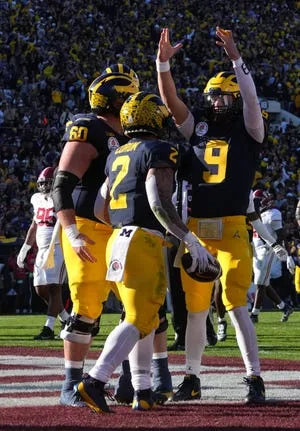In a sport accustomed to recycling its national champion from the same small pool of programs, the last match of this college football season will offer something that hasn't been seen in over three decades and that unfortunately we will never see him again.
Big Ten vs. Pac-12.
Midwest versus West Coast.
And perhaps most surprising given the modern history of the sport, Michigan vs. Washington.
From the start of the BCS era in 1998 until the final year of the four-team College Football Playoff, Ohio State was the only Big Ten program to win a national title while Southern Cal was the only Pacific program. time zone to complete the job.
That will change on Monday thanks to this match. And then, for better or worse, conference chest-thumping will be just another relic of the sport's past.
There will be a lot of talk over the next few days about how Washington and Michigan will be a conference matchup next season in the Big Ten — a shining moment for new commissioner Tony Petitti and a reminder of the historic embarrassment assumed by George Kliavkoff while his Pac-12 collapsed this autumn.
Even if Washington wins, this will not be a last hurray but rather a representation of a wasted promise that generations of Pac-12 administrators have allowed to wither away in their arrogance and incompetence. And the fact that there is no longer a major West Coast-based conference is a humiliation that deserves more than a shrug and empty platitudes about the inevitability of change.
The fact is that conference pride – including those cringe-worthy chants of “SEC!” — is a big part of what has made college football interesting for decades. But it wasn't just about the logo your team wore, it was a symbol of We shared traditions and idiosyncrasies that everyone within a conference understood. It was like being part of a dysfunctional family that might fight all year long but still come to the table and enjoy a nice Thanksgiving.
But these leagues we're about to have next season?
This is not a conference in the sense we know. When Texas and Oklahoma arrive To bring the SEC to 16 members, some of the big backyard brawls that made the league what it is will be turned into expendable games that rotate on and off the schedule. And when the Big Ten adds Washington alongside Oregon, USC and UCLA become an 18 team monstrositythe only thing that will unite them culturally will be the incessant quest for money.
Let's not forget the ACC, what really undermined this whole Atlantic coast thing adding two teams from California (Cal and Stanford) and one from Texas (SMU). Or the Big 12, which was the most regionally consistent league until everything blew up and it had to take over schools in Cincinnati, Orlando and the greater Phoenix area to ensure its survival.
These are no longer cohesive leagues built on academic and cultural commonalities, they are restaurant chains trying to plant their flag in every suburban mall with foot traffic and good parking. You might as well root for Chipotle and Starbucks.

The fact is, if Washington wins the national championship, it will mean something to the institution of West Coast football. Even for Washington's rivals, it should be a mark of pride that a team can actually achieve this in the Pac-12 despite all the obstacles these teams have faced. This should be an inspiration to all high school coaches, from Seattle to San Diego, who have seen so many of their best players end up at schools like Alabama and Georgia because of the perception that football is taken more seriously there than in their own backyard. .
If Michigan wins his first outright national title since Harry Truman was president, it will significantly change perception in the Midwest. Among all these regional powers, the latest national championships won by Penn State, Nebraska and Notre Dame are starting to fade from the rearview mirror to the scrapbook. Only Ohio State seemed capable of acquiring enough talent to compete on the biggest stage of college football's modern era.
But what does all this really mean when college football is no longer a sport where regionality matters? What is the point of comparing one conference to another when we now know that the real debate is about which one earns the most money from its television contracts?
Sure, they'll continue to score points, but the most important game — the SEC versus the Big Ten — is going to continue until they're done consuming the elements they want from the rest of college sports. A few years ago, fans from both leagues could attend any SEC-Big Ten game because it was a clash of styles and ideologies.
It's now a fight for TV windows and the remains of other leagues that may collapse in the near future (lI'm looking at you, ACC). It's not as charming.
But on Monday, before college football becomes completely corporate, we will have a national champion who truly represents a conference and a region of the country. Unfortunately, this is the last time that will have any meaning.


